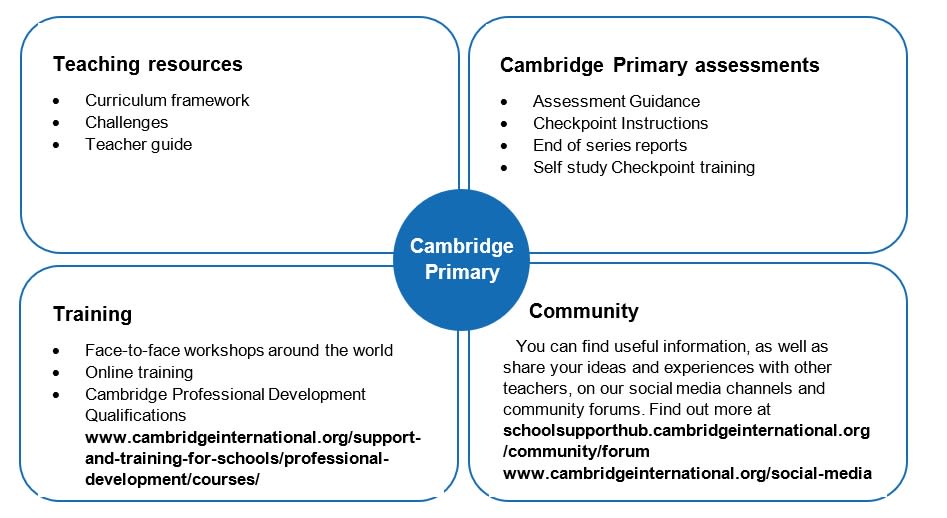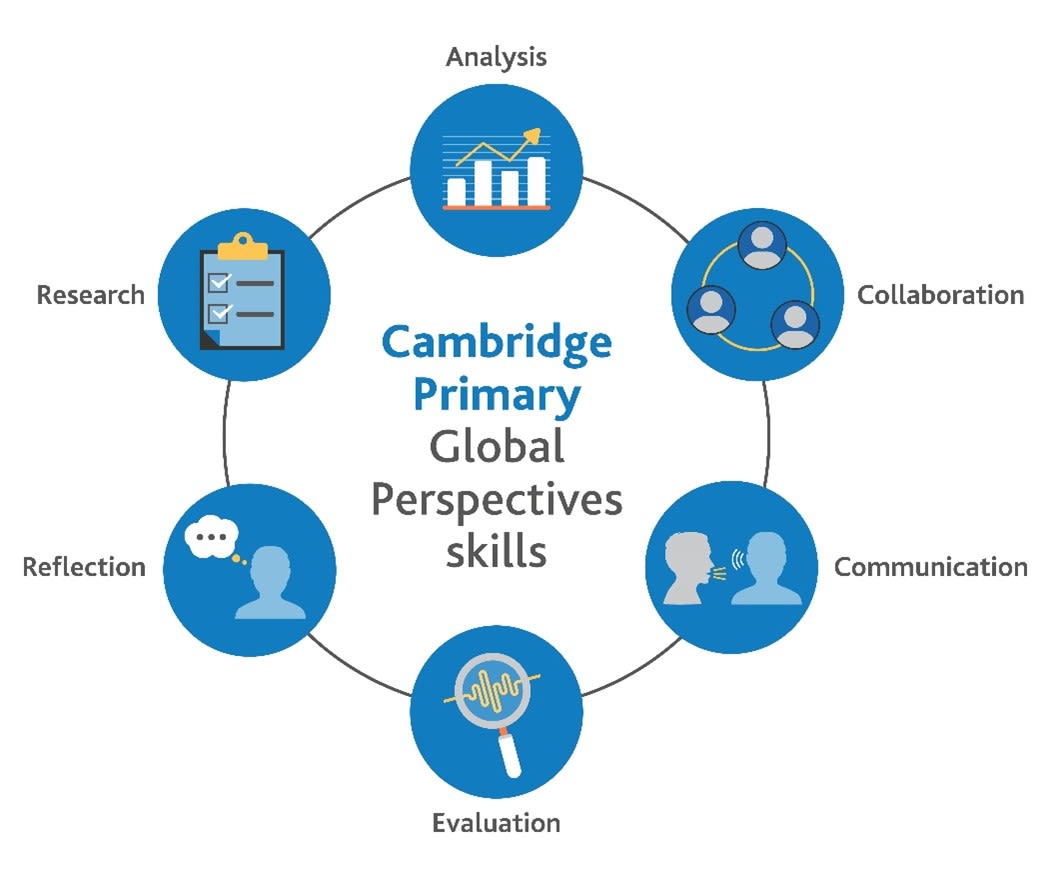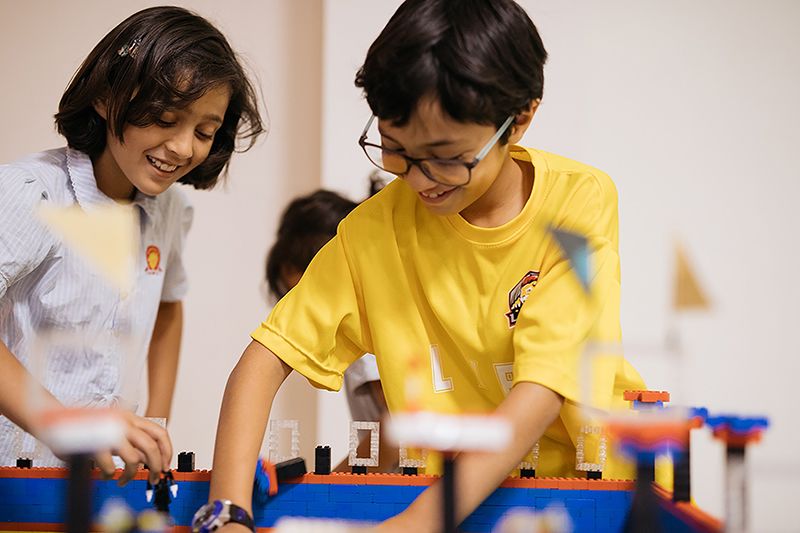A guide to
Cambridge Primary Global PerspectivesTM

Introduction
Cambridge Primary Global Perspectives allows learners aged 5 to 11 to develop and embed the skills of analysis, collaboration, communication, evaluation, reflection and research from the beginning of their formal education. Research shows that the earlier learners start to develop and practise these transferable skills, the greater the impact on their learning. These skills will support them in their studies in primary and prepare them for Cambridge Lower Secondary and beyond.
In Cambridge Primary Global Perspectives, learners:
- become increasingly independent learners able to apply the skills of analysis, collaboration, communication, evaluation, reflection and research in everyday situations and when studying other subjects
- explore personal, local and global perspectives to make sense of, and feel connected to, the world around them
- develop an understanding and awareness of global issues, their causes and consequences
- make decisions about the information they read, hear and see
- work together as a team to achieve shared goals
- engage with others' ideas, ask questions and communicate their own views
- reflect on their progress, contributions and learning
- use information and sources to suggest solutions for problems faced by their community.
Teaching Cambridge Primary Global Perspectives
We provide a wide range of practical resources, detailed guidance, innovative training and professional development so that you can give your learners the best possible experience of Cambridge Primary Global Perspectives.

We believe that for teaching and learning to be effective, there should be alignment between curriculum, pedagogy and assessment. We have designed Cambridge Primary Global Perspectives around this principle:

Curriculum – taken from Primary Global Perspectives Curriculum Framework
34 Rs.03 Conduct investigations, using interviews or questionnaires, making observations and taking appropriate measurements
Pedagogy – activity taken from the Stage 4 Challenge 'Where does my food come from?'
Learners interview people from a local shop, supermarket or local food manufacturer about the reasons for transporting food and ingredients. Learners in groups prepare a structured questionnaire to support the interviews and subsequent analysis (see Teacher Resource – Where does my food come from? T4.2). The local ‘experts’ may be interviewed in school or in a class visit to their workplaces, depending on local circumstances and time available.
Learners use the information gathered to create mind maps or spider diagrams showing the range of reasons for the international transport of food and ingredients. They highlight reasons: seasonal availability; agricultural expertise; cost of manufacture; where the food grows naturally; food fashions; providing jobs for people, etc.
In small groups, learners design a poster for display showing the main reasons for the transportation of food. This can be added to any display from the previous activity.
Lead a discussion to apply learners’ findings on food to transport of goods and people more widely, eliciting the reasons for increased international transportation in general.
Assessment
The outputs produced by learners (mind maps or spider diagrams) demonstrate to the teacher that learners understood and can synthesise the information gathered from interviews and questionnaire. Discussion provides an opportunity to show that learners can apply the knowledge gained to another context.
Cambridge Global Perspectives Curriculum Framework
The Cambridge Primary Global Perspectives Curriculum Framework is available to download on the Global Perspectives (0838) page of the Cambridge Primary support site. It provides a comprehensive set of learning objectives. The learning objectives give a structure for teaching and learning and can be used to assess learners’ ability and skills development.
We have divided the learning objectives into six main areas called ‘strands’, which run through every stage. Each strand corresponds to one of the skills: Analysis, Collaboration, Communication, Evaluation, Reflection and Research.

Separate learning objectives are provided for Stages 1 and 2 as cognitive development is rapidly changing in these stages. In Stages 3 and 4 the same objectives can be used to structure learning, but the range of materials and contexts provided to learners will be increasingly complex. The same is true of Stages 5 and 6 where the same learning objective can be used to plan teaching across both years.
It may be appropriate to introduce this framework at slightly different ages to suit your own context.
The words 'perspective' and 'issue' have particular meanings in the context of Cambridge Primary Global Perspectives. These meanings are:
Issue: an important subject or problem for discussion
Perspective: a viewpoint on an issue based on evidence and reasoning.
We have designed the learning objectives in Cambridge Primary Global Perspectives so learners progress along the Cambridge Pathway. For example, the skill of Analysis includes 'Identifying perspectives' and learning objectives at each stage describe what learners should be able to do:
| Stage 1 | Stage 2 | Stages 3 and 4 | Stages 5 and 6 |
|---|---|---|---|
| 1A.01 Say something known about an issue | 2A.01 Recognise that different people know different things about an issue | 34A.01 Recognise that people think or believe different things about an issue | 56A.01 Identify some key points from different perspectives on the same issue within a source |
Sharing knowledge and listening to what others know about an issue prepares learners to recognise that different people have different knowledge. They also have different thoughts and beliefs about issues. You can start to introduce the idea of perspectives when discussing learners’ thoughts and beliefs. This will prepare them to identify information from different perspectives in a source, first with your support and then independently.


Cambridge Global Perspectives Curriculum Framework
The Cambridge Primary Global Perspectives Curriculum Framework is available to download on the Global Perspectives (0838) page of the Cambridge Primary support site. It provides a comprehensive set of learning objectives. The learning objectives give a structure for teaching and learning and can be used to assess learners’ ability and skills development.
We have divided the learning objectives into six main areas called ‘strands’, which run through every stage. Each strand corresponds to one of the skills: Analysis, Collaboration, Communication, Evaluation, Reflection and Research.

Separate learning objectives are provided for Stages 1 and 2 as cognitive development is rapidly changing in these stages. In Stages 3 and 4 the same objectives can be used to structure learning, but the range of materials and contexts provided to learners will be increasingly complex. The same is true of Stages 5 and 6 where the same learning objective can be used to plan teaching across both years.
It may be appropriate to introduce this framework at slightly different ages to suit your own context.
The words 'perspective' and 'issue' have particular meanings in the context of Cambridge Primary Global Perspectives. These meanings are:
Issue: an important subject or problem for discussion
Perspective: a viewpoint on an issue based on evidence and reasoning.
We have designed the learning objectives in Cambridge Primary Global Perspectives so learners progress along the Cambridge Pathway. For example, the skill of Analysis includes 'Identifying perspectives' and learning objectives at each stage describe what learners should be able to do:
| Stage 1 | Stage 2 | Stages 3 and 4 | Stages 5 and 6 |
|---|---|---|---|
| 1A.01 Say something known about an issue | 2A.01 Recognise that different people know different things about an issue | 34A.01 Recognise that people think or believe different things about an issue | 56A.01 Identify some key points from different perspectives on the same issue within a source |
Sharing knowledge and listening to what others know about an issue prepares learners to recognise that different people have different knowledge. They also have different thoughts and beliefs about issues. You can start to introduce the idea of perspectives when discussing learners’ thoughts and beliefs. This will prepare them to identify information from different perspectives in a source, first with your support and then independently.
Pedagogy
The Curriculum Framework gives you a list of learning objectives across six stages (Stages 1 to 6). Our support materials then give you guidance on:
- long term planning (how to cover the learning objectives in each stage)
- using and adapting Challenges with suggested activities
- lesson planning
- teaching and learning approaches
- the role of the teacher.
Our support materials include:
- Challenges
- Lesson plans
- Teacher Guide
- Videos
- Training
Find and access these support materials, on the Global Perspectives (0838) page of the Cambridge Primary support site.
The Curriculum Framework is a planning tool. It supports skill development by showing how learners will revisit and engage with concepts at deeper levels and in different contexts throughout the programme. The learning objectives in the Curriculum Framework have been designed to support learners’ progression through the different stages. The sub-strands divide the skill areas into more specific and measurable targets for teaching and learning.
The table shows some examples of how skills development progress across stages:
| Stage 1 | Stage 6 | |
|---|---|---|
| Collaboration: Working together | 1Cl.01 Work positively with others, sharing resources while working independently or with a partner | 56Cl.01 Work positively with team members, contributing useful ideas and helping to solve problems to improve team work or to achieve a shared outcome |
| Evaluation: Evaluating perspectives and arguments | 1E.02 State an opinion about a given issue | 56E.02 Discuss own opinion about another's perspective, identifying points you agree or disagree with |
| Research: Recording findings | 1Rs.04 Record information on a given issue in pictograms or simple graphic organisers | 56Rs.04 Select, organise and record relevant information from sources and findings from primary research, using an appropriate method |
Cambridge Primary Global Perspectives is taught through a series of Challenges. The Challenges are a set of teaching and learning materials that use topics to provide stimulating contexts for the development of specific skills and learning objectives.
Challenges include suggested activities that require learners to analyse, collaborate, communicate, evaluate, reflect or research. Activities are designed to encourage learners to consider and connect personal, local and global perspectives related to an issue. You can find more guidance in Section 1 of the Cambridge Primary Global Perspectives Teacher Guide.
Cambridge Primary Global Perspectives gives learners the opportunity to develop important skills while exploring significant global topics, and issues within these topics. The topics give learners a stimulating context in which to develop skills; however, there is no required content for Cambridge Primary Global Perspectives. Learners do not need to study specific topics or issues and they do not have to learn specific content.
This diagram shows how skills, topics, issues and perspectives are combined in each Challenge.


Assessment guidance
There are many ways to assess how learners’ skills develop during Cambridge Primary Global Perspectives. Each Challenge provides opportunities to identify progress, give feedback and discuss next steps with learners. The Cambridge Primary Global Perspectives Teacher Guide offers guidance on how to use the Challenges to assess skill development and provide formative feedback to learners.
Assessment guidance provides support and advice on how to assess learners in the classroom, including:
- examples of how teaching and learning activities can be assessed
- approaches to recording achievement
- different approaches to reporting results.
There is no Cambridge Primary Progression Test for this subject.
Find the Assessment guidance on the Cambridge Global Perspectives (0838) page of the Cambridge Primary support site.
Cambridge Primary Checkpoint Global Perspectives
Cambridge Primary Checkpoint Global Perspectives recognises learner achievement and is intended for the final year of primary education, Stage 6. The assessment is a Team Project designed to assess the skills of analysis, collaboration, communication, evaluation, reflection and research. With your support and guidance, learners work as a team (of three or four learners) to identify a local issue (in their community) that they would like to improve, change or resolve. Each team of learners conducts research on the issue and identifies, explores and explains different perspectives (personal, local/national and/or global) on their chosen issue. They set a goal to improve, change or resolve the local issue, and agree and take a course of action which is likely to achieve this goal.
This diagram shows each stage of the Team Project and the allocation of marks for each part of the assessment.

The Team Project is marked by teachers and moderated by Cambridge International. It is similar to the Team Project component of Cambridge IGCSE and O Level Global Perspectives and so, unlike other Cambridge Primary subjects with Checkpoint assessments, there are no written tests provided for Cambridge Primary Global Perspectives. You can find all of the information you need about the assessment in Cambridge Primary Global Perspectives Checkpoint Instructions.
There are two Cambridge Primary Checkpoint exam series every year. To enter your learners, go to the Making entries area on Cambridge International Direct.

Assessment guidance
There are many ways to assess how learners’ skills develop during Cambridge Primary Global Perspectives. Each Challenge provides opportunities to identify progress, give feedback and discuss next steps with learners. The Cambridge Primary Global Perspectives Teacher Guide offers guidance on how to use the Challenges to assess skill development and provide formative feedback to learners.
Assessment guidance provides support and advice on how to assess learners in the classroom, including:
- examples of how teaching and learning activities can be assessed
- approaches to recording achievement
- different approaches to reporting results.
There is no Cambridge Primary Progression Test for this subject.
Find the Assessment guidance on the Cambridge Global Perspectives (0838) page of the Cambridge Primary support site.
Cambridge Primary Checkpoint Global Perspectives
Cambridge Primary Checkpoint Global Perspectives recognises learner achievement and is intended for the final year of primary education, Stage 6. The assessment is a Team Project designed to assess the skills of analysis, collaboration, communication, evaluation, reflection and research. With your support and guidance, learners work as a team (of three or four learners) to identify a local issue (in their community) that they would like to improve, change or resolve. Each team of learners conducts research on the issue and identifies, explores and explains different perspectives (personal, local/national and/or global) on their chosen issue. They set a goal to improve, change or resolve the local issue, and agree and take a course of action which is likely to achieve this goal.
This diagram shows each stage of the Team Project and the allocation of marks for each part of the assessment.

The Team Project is marked by teachers and moderated by Cambridge International. It is similar to the Team Project component of Cambridge IGCSE and O Level Global Perspectives and so, unlike other Cambridge Primary subjects with Checkpoint assessments, there are no written tests provided for Cambridge Primary Global Perspectives. You can find all of the information you need about the assessment in Cambridge Primary Global Perspectives Checkpoint Instructions.
There are two Cambridge Primary Checkpoint exam series every year. To enter your learners, go to the Making entries area on Cambridge International Direct.